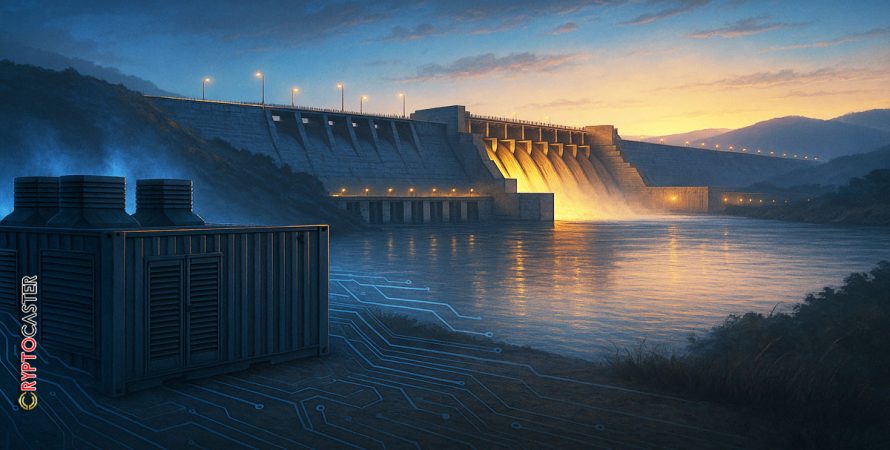By CryptoCaster Editorial · Markets · September 24, 2025 · 7-min read
Ethiopia’s cheap hydropower lured global bitcoin miners and generated hard-currency revenue. Then, with demand soaring and electrification still incomplete, the state utility froze new power permits and signaled a phase-out—just as the massive GERD dam was inaugurated.
Stay in the know on crypto by frequently visiting Crypto News Today
The short boom
For much of 2024–2025, Ethiopia looked like the perfect match for energy-hungry bitcoin miners: abundant hydro, low tariffs, and a government willing to sell power for hard currency. A wave of operators—many from China after Beijing’s ban—set up shop, paying a few cents per kWh and, according to multiple reports, delivering about $55 million to the state utility in under a year. The Africa Report
CryptoCaster Quick Check:
The Grand Ethiopian Renaissance Dam (GERD)—Africa’s largest—became the symbol of this hydropower thesis. Ethiopia officially inaugurated GERD on September 9, 2025, touting eventual capacity above 5,000 MW and an ambition to end outages and even export power across the region. Reuters+1
But the same headlines carried a paradox: electrification remains incomplete and contested. Even as GERD turns on, grid access is still limited, especially in rural areas—one reason policy makers are sensitive to who gets priority on electrons. Reuters
The pause—and why it happened
In August 2025, Ethiopian Electric Power (EEP) halted new electricity supply permits for “data mining companies”—the category under which bitcoin miners operate—saying capacity to accept fresh demand had been reached. Local tech outlets and fintech reporters confirmed the freeze following EEP’s annual review meeting. Shega+1
The freeze wasn’t just optics. A home-market debate had been building for months: crypto-related data centers were on track to consume nearly a third of national electricity in 2025, per coverage of the Ethiopian Energy Outlook 2025. That projection collided with national goals for universal access and industrialization. The Reporter Ethiopia
Within days of the freeze, additional reporting said the utility intended to wind down bitcoin mining in stages to reduce grid strain—another signal that the boom’s second act would be smaller and more selective. (EEP’s average tariff quoted to miners hovered around $0.031/kWh in foreign currency, underscoring why the country became a magnet in the first place.) LinkedIn
What the numbers mean
The often-quoted $55 million figure matters for two reasons: it shows miners really did provide hard currency at a moment Ethiopia needed it—and it’s small relative to the country’s total energy ambitions. GERD alone aims to more than double national capacity over time, but commissioning is staged and transmission build-out lags generation. Policymakers are weighing that foreign-exchange upside against the political optics of powering server farms while households and factories still face rationing. The Africa Report+1
Another context shift: with GERD now inaugurated, regional power exports (Kenya, South Sudan and others have signaled interest) are back on the table. Selling regulated power to neighbors can be more predictable than volatile miner demand, especially if public sentiment turns against crypto’s footprint. AP News
The 2026 question: what happens next?
- Existing sites: Operators already connected may keep running under legacy contracts, but any expansion will be hard to approve while the freeze holds and a phase-down is contemplated. Expect tighter scrutiny on load profiles, grid locations, and currency inflows. Mariblock+1
- Tariffs & terms: The quoted ~$0.03/kWh rate will face upward pressure if EEP prioritizes domestic industry or exports. Some miners may relocate to neighboring grids or to off-grid hydro if permitted. LinkedIn
- Public narrative: The optics war matters. With half the country still lacking reliable access, “crypto vs. households” will remain a hot headline unless miners can prove grid-friendly, interruptible, and additive designs (e.g., consuming true surplus, funding transmission). Reuters
- Global headwinds: Beyond Ethiopia, policymakers are reconsidering crypto mining’s externalities; proposals for taxes/levies and stricter energy accounting keep moving through international forums—another macro risk for large, grid-connected fleets. The Verge
Bottom line
Yes, Ethiopia powered a real bitcoin mining boom—cheap hydro, foreign-currency contracts, and a pipeline of operators that briefly made the country a post-China refuge. But 2025 flipped the script: a national push to prioritize electrification and energy security led to a freeze on new permits and signals of a phase-down. GERD’s inauguration is a milestone, not a blank check. The winners in the next chapter will be the miners (and partners) who can meet Ethiopia on Ethiopia’s terms: flexible loads, clear FX benefits, local jobs—and no competition with the lights at home.
If this article brought you clarity, insight, or value—support the work that made it possible.
At CryptoCaster, we report on Web3, crypto markets, and institutional finance with no billionaire owners, no shareholders, and no hidden agenda. While mainstream media bends toward Elon Musk, BlackRock, and JPMorgan narratives, we stay focused on what matters: truth, transparency, and the public interest.
We don’t just cover the headlines—we investigate the power structures behind them. From FTX and Ripple to the quiet push for CBDCs, we bring fearless reporting that isn’t filtered by corporate interests.
CryptoCaster is 100% paywall-free. Always has been. To keep it that way, we depend on readers like you.
If you believe independent crypto journalism matters, please contribute—starting at just $1 in Bitcoin or Ether. Wallet addresses are below.
Your support keeps us free, bold, and accountable to no one but you.
Thank you,
Kristin Steinbeck
Editor, CryptoCaster
Support CryptoCaster: The Unfolding of Money
At CryptoCaster.world, we’re dedicated to bold journalism, sharp insights, and fearless commentary across blockchain, Web3, and crypto markets. Your **Bitcoin contributions** help us stay independent and continue delivering signal over noise.
🚨 CryptoCaster does not offer investment advice. Always DYOR—volatility is real, and risk tolerance matters.
Support our mission. Contribute BTC today.
🔗 Bitcoin Address:
3NM7AAdxxaJ7jUhZ2nyfgcheWkrquvCzRm
Thank you for backing our journalistic lens as we chronicle the Unfolding of Money — a saga still being written in real time.![]()
CRYPTOCASTER HEATMAP








